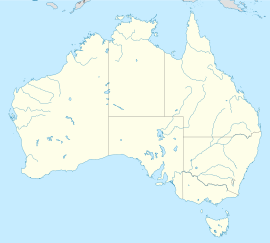Melbourne, Victoria, Australia
|
Melbourne Victoria |
|||||||
|---|---|---|---|---|---|---|---|

(From top left to bottom right) Melbourne City Centre, Flinders Street Station, Shrine of Remembrance, Federation Square, Melbourne Cricket Ground, Royal Exhibition Building.
|
|||||||
| Coordinates | 37°48′49″S 144°57′47″E / 37.81361°S 144.96306°ECoordinates: 37°48′49″S 144°57′47″E / 37.81361°S 144.96306°E | ||||||
| Population | 4,641,636 (2016) (2nd) | ||||||
| • Density | 453/km2 (1,170/sq mi) | ||||||
| Established | 30 August 1835 | ||||||
| Elevation | 31 m (102 ft) | ||||||
| Area | 9,990.5 km2 (3,857.4 sq mi)(GCCSA) | ||||||
| Time zone | AEST (UTC+10) | ||||||
| • Summer (DST) | AEDT (UTC+11) | ||||||
| Location | |||||||
| LGA(s) | 31 Municipalities across Greater Melbourne | ||||||
| County | Grant, Bourke, Mornington | ||||||
| State electorate(s) | 54 electoral districts and regions | ||||||
| Federal Division(s) | 23 Divisions | ||||||
|
|||||||
Melbourne (/ˈmɛlbərn/) is the capital and most populous city of the Australian state of Victoria, and the second-most populous city in Australia and Oceania. The name "Melbourne" refers to an urban agglomeration spanning 9,900 km2 (3,800 sq mi), which comprises the broader metropolitan area, as well as being the common name for its city centre. The metropolis is located on the large natural bay of Port Phillip and expands into the hinterlands towards the Dandenong and Macedon mountain ranges, Mornington Peninsula and Yarra Valley. Melbourne consists of 31 municipalities. It has a population of 4,641,636 as of 2016[update], and its inhabitants are called Melburnians.
Founded by free settlers from the British Crown colony of Van Diemen's Land on 30 August 1835, in what was then the colony of New South Wales, it was incorporated as a Crown settlement in 1837. It was named "Melbourne" by the Governor of New South Wales, Sir Richard Bourke, in honour of the British Prime Minister of the day, William Lamb, 2nd Viscount Melbourne. It was officially declared a city by Queen Victoria, to whom Lord Melbourne was close, in 1847, after which it became the capital of the newly founded colony of Victoria in 1851. During the Victorian gold rush of the 1850s, it was transformed into one of the world's largest and wealthiest cities. After the federation of Australia in 1901, it served as the nation's interim seat of government until 1927.
...
Wikipedia

